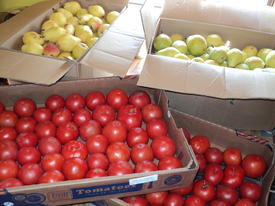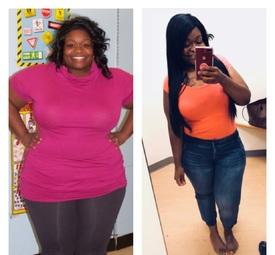I gained a pound! :O

xxMyWeighxx
Posts: 91 Member
today i gained a pound when i stepped on the scale this morning & now i think i screwed it up even more by eating so little today. i got scared & ate 800 calories then exercised 716 of it off :O should i eat 1200 calories tomorrow and barely exercise or what should i do?
0
Replies
-
Its only 1 pound and could be any number of things. I wouldn't worry about it too much and stay focused.
As for today its not over, eat something!0 -
Yeah, get used to pounds flexing up and down day by day. If you let it get to you so much that you eat only 800 cals a day, you should stop weighing yourself.
Use your logic, and know that one pound of FAT (which is what you're trying to lose) is equal to 3500 calories. Water weighs a lot, as only two cups is a pound. I.E., depending on if you ate a lot of sodium the day before (or even more than usual), your body will hold on to water. Also, if you worked out hard, your body will retain water. It doesn't take much before water will show up on the scale and make you think you've gained weight in fat.
Also, scales aren't always perfectly reliable. Keep that in mind.
Relax, friend, it is okay to gain occasionally; just don't let it freak you out. Stay the course and use your head.0 -
ok i will try to eat more tonight i didn't know if i should because i wasn't sure if i had made things better or worse by not eating as much today
 0
0 -
Your body goes into "shock" mode and will store fat for the "famine" you are putting it through--hence the weight gain. Follow the plan--daily. Overdoing it one day won't make a great deal of difference in the long run but weight loss and fitness is a life long battle. Additionally, there's water weight gain, muscle gain, thinking about chocolate gain! Take your measurements--it's a better guide to weight loss OR weigh once a week when starting out. Good luck!0
-
Are you weighing daily? I would not weigh every day, only once a week and at the same time per day. There are so many things that can affect it that I would not worry!
 0
0 -
yeah im weighing daily. i didnt know you werent supposed to
 0
0 -
I do weigh daily, and I record it on a calendar where I also record how many calories, how many grams of protein, and what work outs I do. This way I can see weekly averages and also what affects changes. There's no way that you're "supposed to" weigh yourself. Just don't drive yourself nuts over little changes.
 0
0 -
I weigh in on Sundays. My birthday was this past week...I didn't want to be "mean" to my loved ones, so I ate lots of cake, and other crap. i gained 1.5 lbs. I'm not worried. I'll stick to my plans this week.0
-
I also weigh daily but only count my Monday weigh in. And I try not to worry about my daily weight. But I've learned alot about my weight changing daily.0
-
I weigh every day but I only record losses on Mondays. Your weight will fluctuate from day to day. I can handle seeing the ups and downs. But if it bothers you, just weigh once a week.
 0
0 -
Do eat0
-
Remmber that gaining muscles might make your weight go up a little. Chin up, you're doing great :-)0
-
I put on a pound and a half last week. A couple of days later the same scale said I was 3 pounds lighter. It can water retention, a discrepancy with the scale itself or a multitude of other things.
Don't worry about.0 -
If you're going to weight daily, you need to know this stuff:
Reposted from here: http://www.healthdiscovery.net/articles/scale_lies.htm (and a number of other places online)
Why The Scale Lies...
We've been told over an over again that daily weighing is unnecessary, yet many of us can't resist peeking at that number every morning. If you just can't bring yourself to toss the scale in the trash, you should definitely familiarize yourself with the
A single teaspoon of salt contains over 2,000 mg of sodium. Generally, we should only eat between 1,000 and 3,000 mg of sodium a day, so it's easy to go overboard. Sodium is a sneaky substance. You would expect it to be most highly concentrated in salty chips, nuts, and crackers. However, a food doesn't have to taste salty to be loaded with sodium. A half cup of instant pudding actually contains nearly four times as much sodium as an ounce of salted nuts, 460 mg in the pudding versus 123 mg in the nuts. The more highly processed a food is, the more likely it is to have a high sodium content.
That's why, when it comes to eating, it's wise to stick mainly to the basics: fruits, vegetables, lean meat, beans, and whole grains. Be sure to read the labels on canned foods, boxed mixes, and frozen dinners. Women may also retain several pounds of water prior to menstruation. This is very common and the weight will likely disappear as quickly as it arrives. Pre-menstrual water-weight gain can be minimized by drinking plenty of water, maintaining an exercise program, and keeping high-sodium processed foods to a minimum.
Another factor that can influence the scale is glycogen. Think of glycogen as a fuel tank full of stored carbohydrate. Some glycogen is stored in the liver and some is stored the muscles themselves. This energy reserve weighs more than a pound and it's packaged with 3-4 pounds of water when it's stored. Your glycogen supply will shrink during the day if you fail to take in enough carbohydrates. As the glycogen supply shrinks you will experience a small imperceptible increase in appetite and your body will restore this fuel reserve along with it's associated water. It's normal to experience glycogen and water weight shifts of up to 2 pounds per day even with no changes in your calorie intake or activity level. These fluctuations have nothing to do with fat loss, although they can make for some unnecessarily dramatic weigh-ins if you're prone to obsessing over the number on the scale.
Otherwise rational people also tend to forget about the actual weight of the food they eat. For this reason, it's wise to weigh yourself first thing in the morning before you've had anything to eat or drink. Swallowing a bunch of food before you step on the scale is no different than putting a bunch of rocks in your pocket. The 5 pounds that you gain right after a huge dinner is not fat. It's the actual weight of everything you've had to eat and drink. The added weight of the meal will be gone several hours later when you've finished digesting it.
Exercise physiologists tell us that in order to store one pound of fat, you need to eat 3,500 calories more than your body is able to burn. In other words, to actually store the above dinner as 5 pounds of fat, it would have to contain a whopping 17,500 calories. This is not likely, in fact it's not humanly possible. So when the scale goes up 3 or 4 pounds overnight, rest easy, it's likely to be water, glycogen, and the weight of your dinner. Keep in mind that the 3,500 calorie rule works in reverse also. In order to lose one pound of fat you need to burn 3,500 calories more than you take in. Generally, it's only possible to lose 1-2 pounds of fat per week. When you follow a very low calorie diet that causes your weight to drop 10 pounds in 7 days, it's physically impossible for all of that to be fat. What you're really losing is water, glycogen, and muscle.
This brings us to the scale's sneakiest attribute. It doesn't just weigh fat. It weighs muscle, bone, water, internal organs and all. When you lose "weight," that doesn't necessarily mean that you've lost fat. In fact, the scale has no way of telling you what you've lost (or gained). Losing muscle is nothing to celebrate. Muscle is a metabolically active tissue. The more muscle you have the more calories your body burns, even when you're just sitting around. That's one reason why a fit, active person is able to eat considerably more food than the dieter who is unwittingly destroying muscle tissue.
Robin Landis, author of "Body Fueling," compares fat and muscles to feathers and gold. One pound of fat is like a big fluffy, lumpy bunch of feathers, and one pound of muscle is small and valuable like a piece of gold. Obviously, you want to lose the dumpy, bulky feathers and keep the sleek beautiful gold. The problem with the scale is that it doesn't differentiate between the two. It can't tell you how much of your total body weight is lean tissue and how much is fat. There are several other measuring techniques that can accomplish this, although they vary in convenience, accuracy, and cost. Skin-fold calipers pinch and measure fat folds at various locations on the body, hydrostatic (or underwater) weighing involves exhaling all of the air from your lungs before being lowered into a tank of water, and bioelectrical impedance measures the degree to which your body fat impedes a mild electrical current. If the thought of being pinched, dunked, or gently zapped just doesn't appeal to you, don't worry. The best measurement tool of all turns out to be your very own eyes. How do you look? How do you feel? How do your clothes fit? Are your rings looser? Do your muscles feel firmer? These are the true measurements of success. If you are exercising and eating right, don't be discouraged by a small gain on the scale. Fluctuations are perfectly normal. Expect them to happen and take them in stride. It's a matter of mind over scale.0 -
Please eat. It's likely water weight. Focus on sticking to your plan, not on the scale, and do not starve yourself. Do not weigh yourself daily, it will make you crazy. Focus on tracking and exercising.0
-
Yeah, get used to pounds flexing up and down day by day. If you let it get to you so much that you eat only 800 cals a day, you should stop weighing yourself.
Use your logic, and know that one pound of FAT (which is what you're trying to lose) is equal to 3500 calories. Water weighs a lot, as only two cups is a pound. I.E., depending on if you ate a lot of sodium the day before (or even more than usual), your body will hold on to water. Also, if you worked out hard, your body will retain water. It doesn't take much before water will show up on the scale and make you think you've gained weight in fat.
Also, scales aren't always perfectly reliable. Keep that in mind.
Relax, friend, it is okay to gain occasionally; just don't let it freak you out. Stay the course and use your head.0
This discussion has been closed.
Categories
- All Categories
- 1.4M Health, Wellness and Goals
- 398.4K Introduce Yourself
- 44.7K Getting Started
- 261K Health and Weight Loss
- 176.4K Food and Nutrition
- 47.7K Recipes
- 233K Fitness and Exercise
- 462 Sleep, Mindfulness and Overall Wellness
- 6.5K Goal: Maintaining Weight
- 8.7K Goal: Gaining Weight and Body Building
- 153.5K Motivation and Support
- 8.4K Challenges
- 1.4K Debate Club
- 96.5K Chit-Chat
- 2.6K Fun and Games
- 4.8K MyFitnessPal Information
- 17 News and Announcements
- 21 MyFitnessPal Academy
- 1.5K Feature Suggestions and Ideas
- 3.2K MyFitnessPal Tech Support Questions











